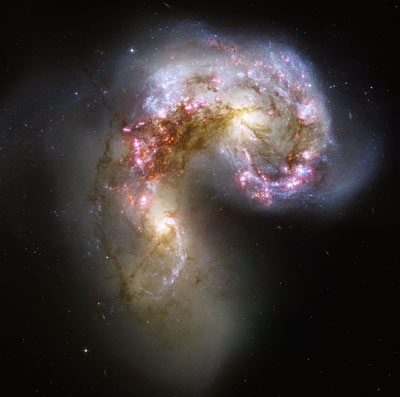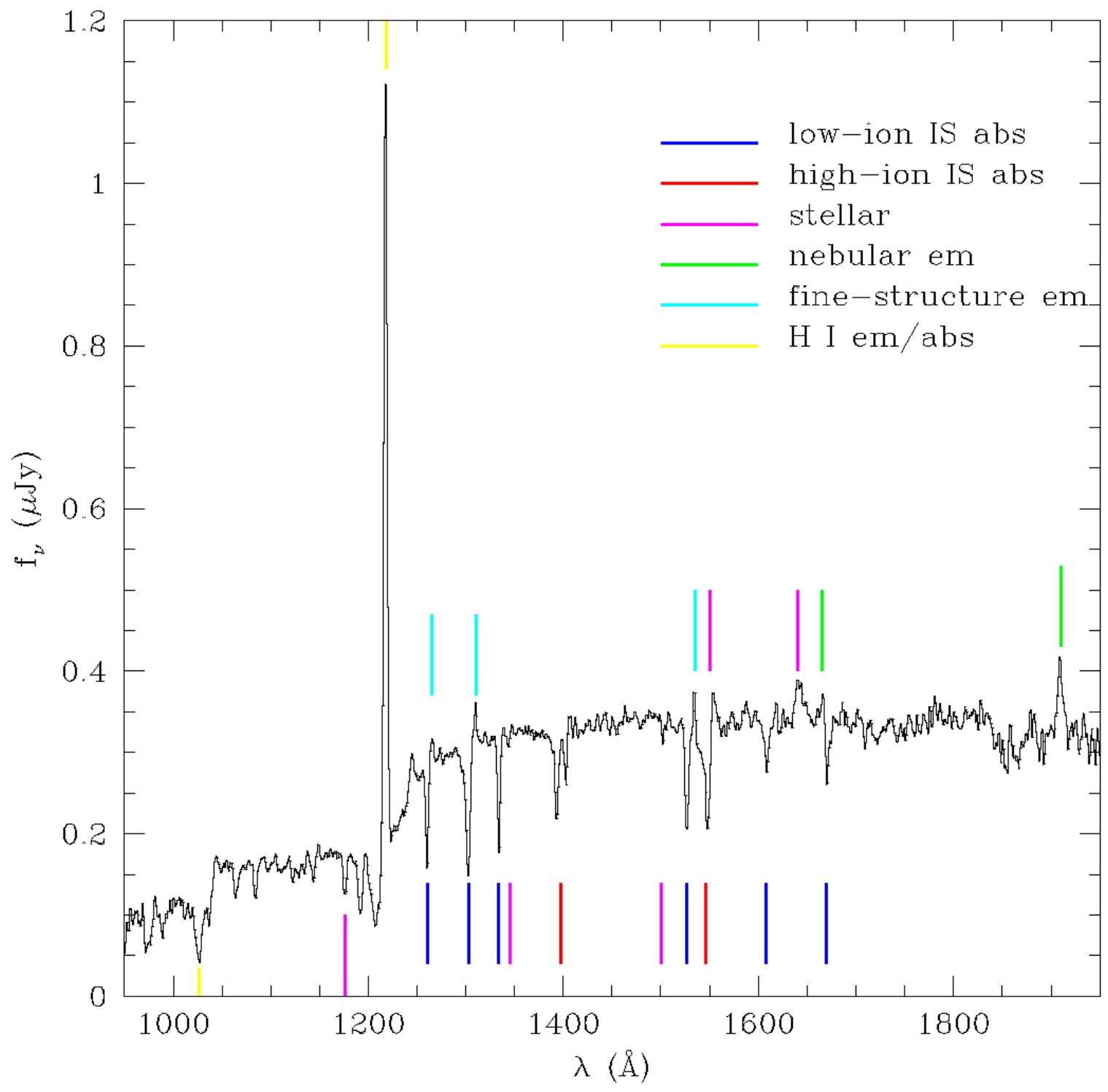Physics 443: Galaxies and the Milky Way
Spring 2023
|
|
Instructor
Andrew Baker
Serin W309
Phone: 848-445-8887
Email: ajbaker[at]physics.rutgers.edu
Office hours: Wed 5-6pm, Thu 4-5pm, and Fri 5-6pm (as available), or by
appointment
Venue
Wed 12:10-1:30pm and Fri 2:00-3:20pm in ARC-206 (Allison Road Classroom Building)
|


|
Textbooks
There is one required textbook for this course:
- Cimatti, Fraternali, & Nipoti (2020),
Introduction to Galaxy Formation and Evolution
(ISBN-13 9781107134768)
Copies of this book should be available in the bookstore, whose website also offers an e-book version.
Overview
Here's the official description from the course catalog:
Prerequisite(s): 01:750:342 or (351 and 361 and 381)
Properties of galaxies: photometry, kinematics and masses. Disk galaxies:
spiral patterns, bars and warps, gas content, star formation rates, chemical
evolution. Elliptical galaxies: shapes. Structure of the Milky Way. Nature of
dark matter.
I plan to broaden this list of topics to include galaxies' relationships with
the circumgalactic medium (CGM) and the intergalactic medium (IGM). In
general, I will try to highlight subjects that are important to areas of
current research in extragalactic astrophysics and cosmology (e.g., galaxy
formation, the enrichment of the intergalactic medium, and the reionization of
the universe).
Schedule
Both the sequence of lectures and the assignment due dates are preliminary
at this point; I will update them as needed during the course of the semester.
I will include in the schedule the dates of any local talks that are
relevant to the subject matter of this course. Attendance is encouraged but
not required!
| LECTURE |
DATE |
TOPIC |
TEXT |
DUE |
| 1 |
Jan 18 |
course introduction; how "old" are galaxies? |
|
|
| |
Jan 18 |
Physics Colloquium (3:30-4:30pm, Serin W330)
L.Y. Aaron Yung (NASA Goddard Space Flight Center)
Paving the Way for Future Space Telescopes with Theory and Simulations |
|
|
| 2 |
Jan 20 |
galaxy velocities and distances |
|
|
| 3 |
Jan 25 |
observations: stars and stellar populations |
|
|
| |
Jan 26 |
|
|
PS1 |
| 4 |
Jan 27 |
observations: gas and dust |
|
|
| 5 |
Feb 1 |
guest lecturer: Prof. Kristen McQuinn
the Local Group |
|
|
| |
Feb 2 |
|
|
WA1 |
| 6 |
Feb 3 |
guest lecturer: Charlotte Olsen
galaxy morphologies |
|
|
| 7 |
Feb 8 |
disk galaxy kinematics: axisymmetric |
|
|
| |
Feb 9 |
|
|
PS2 |
| 8 |
Feb 10 |
disk galaxy kinematics: axisymmetric |
|
|
| 9 |
Feb 15 |
disk galaxy kinematics: bars |
|
|
| |
Feb 16 |
|
|
WA2 |
| 10 |
Feb 17 |
guest lecturer: Prof. Saurabh Jha
disk galaxy kinematics: spirals |
|
|
| 11 |
Feb 22 |
galaxy centers and scaling relations |
|
|
| |
Feb 23 |
|
|
PS3 |
| 12 |
Feb 24 |
elliptical galaxies: dynamics |
|
|
| 13 |
Mar 1 |
elliptical galaxies: stars and gas |
|
|
| |
Mar 2 |
|
|
WA3 |
| 14 |
Mar 3 |
elliptical galaxies: scaling relations |
|
|
| 15 |
Mar 8 |
galaxy environments |
|
|
| |
Mar 9 |
|
|
PS4 |
| 16 |
Mar 10 |
the expanding universe |
|
|
| 17 |
Mar 22 |
the growth of structure |
|
|
| |
Mar 23 |
|
|
WA4 |
| 18 |
Mar 24 |
the properties of dark matter halos |
|
|
| 19 |
Mar 29 |
the formation of galaxies |
|
|
| |
Mar 30 |
|
|
PS5 |
| 20 |
Mar 31 |
galaxy formation: theory vs. observations |
|
|
| 21 |
Apr 5 |
active galactic nuclei (AGN) |
|
|
| |
Apr 6 |
|
|
WA5 |
| 22 |
Apr 7 |
the "baryon cycle": star formation and chemical evolution |
|
|
| 23 |
Apr 12 |
the "baryon cycle": outflows and the intergalactic medium |
|
|
| |
Apr 13 |
|
|
PS6 |
| 24 |
Apr 14 |
finding high-redshift galaxies |
|
|
| 25 |
Apr 19 |
guest lecturer: Prof. Eric Gawiser
properties of high-redshift galaxies |
|
|
| |
Apr 20 |
|
|
WA6 |
| 26 |
Apr 21 |
student presentations |
|
|
| 27 |
Apr 26 |
student presentations |
|
|
| 28 |
Apr 28 |
student presentations |
|
|
Grading
Your course grade will be based on a weighted combination of four elements:
- participation during class, which incudes no use of personal devices
for texting or emailing (10%)
- six biweekly problem sets (40%)
- six biweekly writing assignments (20%)
- final project (30%)
Class participation will be scored as follows for each session:
- 10/10 points for asking or answering a question during class
- 7/10 points for being present and attentive during class
- 4/10 points for using a personal device to text or email during class
To have a given absence excused from your semester average for class
participation, you must file a report at this website.
Homework assignments will be due in Canvas on Thursday at 11:59pm.
Assignments will be of two types:
- problem sets (denoted "PS" above), which will include
straightforward examples or extensions of material discussed in lecture, as
well as more involved applications to areas of current research that may
encompass some computational work
- writing assignments (denoted "WA" above), which will require
no more than one page of text (prepared using a standard LaTeX template) and
will be graded for prose style as well as content
The final project will include an oral presentation (delivered in one of the
last three regular class meetings) and a written paper (due at 11:59pm on May
9) on a topic relevant to extragalactic astronomy. The presentation should
make use of slides and be ten minutes long. The paper should include 4-6
pages long (using a standard LaTeX template), as well as figures and
references in addition to the 4-6 pages of text. You may propose a
topic for your final project at any time between now and March 10th, by
sending me an email with the specific topic and at least five references from
the astronomical literature that you propose to use. I will approve projects
on a first-come, first-serve basis; for any student who does not propose a
topic of your own, I reserve the right to choose a topic for you after
spring break.
Other items
- Absences
I will have to miss four of our regularly scheduled classes, which will be
taught by guest lecturers (or recorded on Zoom) in my absence. If you need to
miss a class for some reason, please file a report at this website. There
will be no direct penalty to your grade for missing class; however, since I
will only be posting slides and equation sheets to the course website, you
will not have the full context of the lecture, and you may need to rely on
your classmates' notes to fill any gaps.
- Late assignments
Unless you request advance permission and I grant it to you, I will start
docking points at a rate of 10% off the top per day for each assignment.
- Collaboration policy
On homework assignments, you should first try every exercise yourself before
discussing it with others. If you get stuck (or finish and would like to
compare answers), you may discuss exercises with other students in the course
and/or me, but you should always write up your own solutions and indicate on
your solutions whom you collaborated with. You may consult books and
published papers, but not old solution sets from previous offerings of this
course or similar courses elsewhere.
- Students with disabilities
If you have a disability, let me know early in the semester so that we
can make the necessary arrangements for you to have a successful learning
experience. Please consult
this web page for more details.
- Student wellness resources
Like my other Rutgers colleagues, I do not want academic success to come at
the expence of your health! The resources listed below are provided in case
you are (or another student is) going through a rough patch.
- 24/7 crisis resources (if you or someone you know is in crisis and having
thoughts of death, dying, or suicide)
- 911 Emergency: if you have an emergency in need of immediate attention,
call 911
- NJ Hopeline
(suicide prevention): 855-654-6735
- National Suicide & Crisis
Lifeline: 988
- Crisis Text
Line: text HOME to 741741
- University Behavioral Health Care Acute
Psychiatric Services (24-hour emergency service for local residents):
855-515-5700
- Rutgers University Police Department: 732-932-7211
- for students living on campus: contact your Resident Assistant (RA) or RA
on duty
- Violence Prevention and Victim Assistance (VPVA): For victims of crimes, including sexual violence, dating/domestic violence, and stalking. Free and confidential resources are available by phone 24/7. vpva.rutgers.edu, 848-932-1181.
- Campus Support Resources (for non-crisis situations)
- Counseling, Alcohol & Other Drug Assistance Program & Psychiatric Services (CAPS): Mental health services, health.rutgers.edu/CAPS,
848-932-7884. M–F, 8:30 am–4:30 pm.
- A CAPS counselor is always available during regular business hours for students with immediate needs (walk in or by phone 848-932-7884).
- CAPS After Hours: A telephone-based counseling service available to Rutgers students when CAPS is closed. Call the main CAPS number,
848-932-7884, and follow the prompts.
- Let’s Talk: informal, one-session consultations, 848-932-7884.
- The Graduate School of Applied & Professional Psychology offers clinical services to Rutgers students: https://gsapp.rutgers.edu/centers-clinical-services/CPS/about-us.
- Violence Prevention and Victim Assistance (VPVA): For victims of crimes, including sexual violence, dating/domestic violence, and stalking. Free and confidential resources are available by phone 24/7. vpva.rutgers.edu, 848-932-1181.
- Offices of the Dean of Students: If you are in need of assistance or support regarding personal or academic-related challenges, contact 848-932-2300, visit deanofstudents.rutgers.edu, or email deanofstudents@echo.rutgers.edu.
- Do Something: If you are not sure what to do about a friend, and they are not in immediate danger, share your concern at dosomething.rutgers.edu. The appropriate campus resource will contact them within 2 business days. Please note this should not be used in an emergency as the response is not immediate.
Last updated February 8, 2023.

